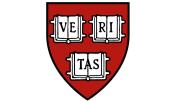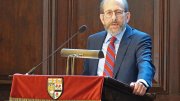This afternoon, at its second meeting of the semester, the Faculty of Arts and Sciences (FAS) continued the protracted debate over unrecognized single-gender social organizations (USGSOs)—namely, proposals by Harvard College to regulate final clubs (and by extension, fraternities and sororities) by imposing sanctions on student members, or by prohibiting membership outright (read the background here—including a summary of past plans to regulate student behavior and of the legislative proposals summarized below).
In this latest iteration, the faculty voted down a motion that would have proscribed sanctions or a blanket prohibition on student membership in such organizations (see the description of the motion below). The vote was 130 against, 90 in favor (by FAS standards, a robust turnout among the more than 700 eligible voting members of the faculty Corrected November 8, 2017, at 10:25 a.m.: There are 882 voting members of the faculty)—by secret, paper ballot, a measure FAS resorts to only rarely.
From here, the major substantive and procedural issues remain:
- what kinds of measures will actually be adopted to change or curtail the USGSOs; and
- by whom—the president, the dean of FAS, or a vote of the faculty itself.
The State of Play
Heading into this afternoon’s discussion, this is how matters stood:
•Sanctions. Current freshmen are, on paper, sanctioned if they join a USGSO: they may not serve in leadership positions in recognized student clubs or groups, nor receive the required Harvard College endorsements for fellowships like the Rhodes or Marshall Scholarship. In practice, enforcement of this new regulation is currently suspended, pending FAS legislative debates and a final decision on the new policy that would, prospectively, prohibit students entering the College in the future, outright, from belonging to such an organization.
•Lewis motion. Gordon McKay professor of computer science Harry Lewis had a motion on the floor to the effect that, as the agenda summarizes it, the College “shall not discipline, penalize, or otherwise sanction students for joining, or affiliating with, any lawful organization, political party, or social, political, or other affinity group.” It aims at upholding the right of association, and also asserting that the authority for establishing the conditions of student life belong to the faculty—two themes he and supporters of this and a prior motion have emphasized since the final club discussions began in the spring of 2016. Having been introduced at the October 3 faculty meeting, this motion was eligible to be voted upon today.
•Allen motion. Conant University Professor Danielle Allen proposed a separate regulatory regime: all student organizations would be brought under Massachusetts law; membership in those that fail to comply would result in expulsion of the student. Although the Faculty Council originally voted 17-0 in favor of the proposal, on subsequent discussion, some uncertainties apparently arose; FAS dean Michael D. Smith indicated to The Harvard Crimson that he was not sure legally how to proceed under the proposal; and Allen announced on October 25 that she had withdrawn her motion, noting that “During the course of Faculty Council deliberations on October 25, I concluded that the view of process that I was trying to lay out was too technical and its interaction with the paradigm change I describe here too subtle to serve well as the basis for debate in our faculty meeting on November 7. Consequently, I have withdrawn my motion, and will instead simply support David Howell’s motion affirming, as a matter of principle, that the Faculty and the University have the responsibility of balancing competing rights and freedoms in such ways as best fulfill our educational mission.”
•Howell motion. That last reference in Allen’s posting is to a new motion, introduced today (and therefore not eligible to be voted on until a subsequent meeting). Professor of Japanese history David Howell, a member of the Faculty Council, has been a critic of Lewis’s arguments. He moved that “the Faculty recognizes that for policies on a college campus, as in society, basic freedoms and rights can come into conflict with each other. In such situations, it is the responsibility of the faculty and administration of Harvard College to establish policies that protect individual freedoms and rights while upholding the educational mission of the College.”
This seemingly neutral language is accompanied by an explanatory memorandum in which he makes the case that asserting a claim for the primacy of a right of free association (the Lewis motion) is not dispositive within the confines of the college community:
Professor Lewis has presented his motion as a statement in favor of our students’ freedom of association. However laudable the sentiment, the motion subordinates all other rights in favor of the freedom of association. It asks us to hold a single personal freedom higher than our mission in every instance, now and forever. It proscribes us from weighing that freedom against other freedoms—from balancing the freedom of association with the freedom from discrimination. It tells Harvard College—its administrators and this Faculty— what it cannot do, no matter the context.
It is important to remember that the obverse of the freedom of association is the freedom to exclude others. Indeed, over the years it has been invoked—by segregationists during the 1960s, for example—for the very purpose of keeping the weak out of spaces and institutions monopolized by the strong. In light of our educational mission, it is especially puzzling that we would select this freedom for special approbation without acknowledging that rights can and will come into conflict. We should not mark such a Janus-faced right for special approbation by a vote of the Faculty. And if we do, we should temper that approbation with a statement that, when a particular individual freedom conflicts with the greater good of the College community, we must favor the community.
In sum, this motion is intended to accomplish three main goals. First, it allows the Faculty to state that it values the personal freedoms of every member of our community. Second, it allows the Faculty to state that it recognizes that tensions sometimes arise between different personal freedoms (e.g., freedom of association and freedom from discrimination) and between a personal freedom and the College’s educational mission. Third, when tensions arise between freedoms in the creation or modification of policy, this motion articulates the Faculty’s aspiration to uphold and advance the College’s educational mission.
•Who decides. The committees organized by Harvard College dean Rakesh Khurana to recommend how to implement the various sanction/regulatory regimes (he promulgated the initial sanctions in 2016) have suggested that it is up to President Drew Faust to make the final decision on what rules will be adopted. Faculty critics of the sanctions have asserted that this is a fundamental matter of faculty governance, not an administration decision. In a recent Crimson report, President Faust has suggested that she will make a final decision before she steps down next June 30; the welter of recommendations for what kind of action to take (sanctions; a prohibition on student membership; some other course of action) will surely not make her decision any easier. Making matters more confusing, Dean Smith indicated in a separate Crimson report that the faculty would have to make the final decision on major changes in policy affecting student social groups, because those changes presumably have to be embedded in the student handbook, on which language the faculty votes.
•Women weigh in. On the eve of the faculty meeting, Lewis hosted a guest post, “Do Not Punish Harvard Women for Men’s Behavior: Vote Yes to the Lewis Motion,” signed by 23 undergraduate women and recent graduates, on his blog. Some of the women who signed were on hand at the Science Center to distribute copies of the statement to faculty members as they arrived for the meeting this afternoon. Lewis’s opponents may regard this as a bit of late-breaking substantive devilment, but beyond making an affirmative case for sororities, it makes two interesting substantive points:
- Regulating male final clubs to protect women from sexual or social abuse is itself sexist and paternalistic. Thus, “The premise has been that women must not be allowed to join groups without men—for their own good—because it is the only way to ‘get at’ men’s final clubs. An underlying justification has been that women must be protected from making bad social decisions such as waiting in line to get into men’s final club parties. Banning women’s off-campus groups is not and has never been about opening women’s support or friendship groups to men, in order to end some supposed form of discrimination against men. The consistent refrain of ‘it’s a shame’ that Harvard must eliminate women’s groups through sanctions or to otherwise deal with the behaviors of men is outrageous and unconscionable. Make no mistake—this is sexism—as it has existed in the past but now in more insidious form, as it is now clothed in anti-discrimination verbiage and purported rationale.”
- Moreover, regulating final clubs is doomed to fail—as the clubs figure out how to evade the new rules. As the post puts it, “All proposed plans thus far would force sororities to shut down, while men’s final clubs—the intended targets of the sanctions—will be virtually unaffected. Clubs will either go underground, perhaps like underground fraternities at Amherst or like secret societies at Yale, or, as more recently discussed, will become alumni clubs, of which students will not ‘officially’ be members until they graduate, taking the clubs even further out of the administration’s purview and making them even more untouchable for reform than they currently are.…In response to current sanctions, overwhelmingly, behind closed doors, most men’s clubs have lawyered up and dug in their heels, knowing they can get around anything thrown at them by the administration, with little to no functional change, in a way that organizations without comparable resources or with national bylaws cannot.”
Close readers of the letter may take note of one signer: Hayley Edgerley ’19. Her parents, Sandra Matejic Edgerley ’84, M.B.A. ’89, and Paul B. Edgerley, M.B.A. ’83, co-chair the FAS capital campaign, and are recognized for their support of the faculty in the naming of the deanship Michael Smith now holds: he is, formally, the Edgerley Family dean of FAS.
The November 7 Debate
Speakers were asked to limit their remarks to three minutes. Lewis, as maker of the motion, spoke first, noting:
Eighteen months ago, during exam period in the spring of 2016, the College announced sanctions against students belonging to certain off-campus organizations. This came as a surprise to everyone, because it had not been voted or even discussed in this Faculty or in any committee of our elected representatives. I made a motion that would have prevented those sanctions from taking effect. It was debated twice, and then the President adjourned last December’s meeting without a vote. A committee was announced to review the policy, and so I respectfully withdrew that motion. Instead the Clark-Khurana committee first proposed much harsher sanctions, and then issued a report with no single recommendation. Through all this time, the rationales for punishing every member of an expanding list of clubs kept shifting, from sexual assault to gender discrimination to exclusivity. Yet the question women students are asking today was never addressed: why are members of women’s groups to be punished at all?
The report stated that the President would choose among the options, even though matters of discipline of students are for this body to decide, not the president or any dean. The president has declined to acknowledge that this matter is within Faculty jurisdiction. I introduced a new version of the motion, and this is its second reading.
Speaking to the principles involved, he continued:
It has been said that we need to be idealistic, to create the best possible environment for our students. But idealism is not the same as utopianism. The history of utopian undertakings is not encouraging. Utopias have an official version of social harmony and tend to punish nonconformists. Students come to Harvard not for a social utopia, but for a liberal education in all its tensions and complexity, an education that teaches them how to use the freedom they enjoy, with advice but without coercion.
My motion ensures that students are, like us, entitled to private decisions about what organizations they join.
Thomas Dingman, dean of freshmen, who rarely speaks at faculty meetings, then addressed the issues in emotional terms. He recognized that the rationale for regulating USGSOs had shifted, and that any such regulation would intrude on one value (freedom of association, in this case) to protect another (protection from hierarchies that exclude individuals from participating in an aspect of the community’s life). Reflecting on his own experience as a member of a final club, Dingman continued, and as a member of the Administrative Board and, for the past 13 years, a neighbor of a final club, he observed that the homogeneous College community of a half-century ago had changed tremendously, and that the peripheral role final clubs played in College social life then had changed, too. “The times have simply changed,” he said: Harvard today has a much more diverse student body, the clubs have come to play a central role, and, consistent with the College’s aims, “students should feel eligible to participate in all of Harvard.” Instead, students returning from their dorm crew assignments run into classmates in tuxedos heading for hired limos to attend exclusive functions.
Opening the clubs’ membership processes would not fundamentally alter this state of affairs, Dingman said, and leaving them unregulated would continue to put freshmen women, on the basis of their appearance, at risk of being exploited. Bringing the clubs under College regulation would require large increases in staffing and expense—unlikely to be forthcoming.
He did not disparage club members per se, Dingman noted: many take good advantage of good opportunities for leadership, and the clubs can foster a sense of belonging to a certain community—but that sense of belonging is not available to everyone. In circumstances where students are excluded on the basis of inherent characteristics (race, gender, and so on), the environment is “toxic,” and so he opposed the Lewis motion because he favored taking actions to rein in the USGSOs.
Porter University Professor Helen Vendler—who has expressed sharp opposition to the policy sanctioning membership in the clubs, because it would intrude on faculty members’ academic recommendations for their students who apply for Rhodes, Marshall, and similar fellowships (the College would withhold its required endorsement from students who belong to a USGSO)—rose to support the Lewis motion. Noting that “as a woman, I don’t like the final clubs,” she advanced multiple reasons (beyond the disqualification of students for fellowships) for opposing the regulatory and sanctions policies the College has advanced, including:
- “The proposed sanctions have been fostered with such incoherence of purpose and such an absence of convincing data that no self-respecting administration could back them, and no self-respecting intellectual could ratify them. The statutes of the University clearly reserve matters of student discipline to the Faculty, not to committees appointed by the Administration.”
- “The sanctions establish our relations with our students as both coercive and punitive. Coercion of obedience (outside the criminal justice system or the military) has never proved effective in a moral sense with either adolescents or adults, and, as an educational institution, we are committed to education rather than coercion as a means to consensus when the community is divided.”
- “To impose one highly abstract value—‘inclusion’—on students is counter to our educational purposes. It is a mistake to assert that ‘Harvard,’ with its thousands of constituents, universally and unequivocally endorses—or ever could endorse—a single abstract ‘value,’ (as is demonstrated by the long history of Harvard’s debates over contested values).”
The Lewis motion, she concluded, “should be supported by any faculty member eager to safeguard his or her own intellectual and behavioral rights as well as those of the students.”
[This paragraph updated and expanded November 8, 2017, 8:10 a.m.] Professor of music Suzannah Clark opposed the Lewis motion because, she said, it was so broad that it would make existing, recognized student organizations and clubs—which must be nondiscriminatory in membership and subject to local, not national, governance—free from any College regulation. “The College has crafted the regulations of the ISOs [independent student organizations] around its principles of non-discrimination and inclusion,” she said. “The collateral effect of the Lewis motion—should it pass—would be to strip the College of its authority to enforce the positive values of the regulations concerning the 400 ISOs. If, however, that is not the intended effect of the Lewis motion, then one would have to ask why the students of one set of organizations should be shielded from Harvard’s regulations of non-discrimination, open membership, and local governance while students in another set of organizations are required to follow them. This inconsistency—and I presume unintended consequence—would perpetuate a bifurcation of Harvard’s student body.”
Maier professor of political economy Benjamin Friedman, who had not been heard from in previous debates on these issues, then rose to give a vigorous defense of the Lewis motion, and to raise broader issues about the faculty’s focus on improving student life. He said:
I speak as, by now, a member of this distinguished faculty for a very long time—and proudly so. But today I am worried, as I have not been in many years, about the direction our faculty and our much-cherished university seems about to take.
I am worried because our students are afraid—and they have cause to be. Some are afraid of what our increasingly intrusive national government threatens. And we have rightly taken note of their concerns. But others are concerned, rightly as well I believe, at the threatened intrusiveness of our own Harvard College administration. Our students do not want us to govern their private lives apart from university activities and away from university property….
I am worried because, while we have heard a great deal about “Harvard values” during our discussions over these past months, I do not recognize the values and the distinctions we seem so intent on imposing. I do not understand why membership in the American Nazi Party is somehow consistent with Harvard values, but membership in the AD Club is not. I am baffled that a young woman who belongs to, say, the Aryan Nations might be fully entitled to serve as president of the Harvard Crimson, or captain of the Harvard tennis team, but not if she belongs to the Bee Club.
I am worried because the administrative machinery we will need to implement the intrusive restrictions we are now considering will inevitably come to resemble those against which this University nobly stood in a prior, now deeply despised era. To draw the necessary distinctions proposed, and implement the associated penalties, we will surely require some form of a Harvard Unaffiliated Activities Committee. And, like the much-loathed HUAC of that prior era, it will have to ask our students some form of the question “are you now, or have you ever been a member of such-and-such a group”? Our grandchildren will not be proud of us.
Finally, I am worried because, in the deceptively harmless-looking motion offered for consideration following this discussion, we face the prospect of abdicating not just our prerogatives as the faculty of Harvard College but our responsibilities too. Rather than addressing our students’ freedoms and the mission of our beloved College by granting blanket authority to our administrators and whatever committees they might choose to appoint, we should face up to the burden of addressing explicitly these freedoms and whatever tensions and conflicts they present. Colleagues of my generation will remember that a seemingly harmless resolution passed by the U.S. Congress in response to an attack on a single American ship in the Gulf of Tonkin provided the legal basis for what became, at that time, our nation’s longest war.…For our faculty to duck its responsibilities by granting such a blanket authorization to our administration would be a historic change for this University. Our successors in future generations will not admire us for it.
I end with a wistful tinge of sadness about what we have been doing here—but also a hope for what we might yet do. Like many colleagues present, I read the file of materials that Dean Smith distributed a year ago in an earlier phase of this discussion. One conclusion stood out clearly: the life of the Houses, those jewels of the Harvard structure, is nowhere near as engaging to our students as it should be, and in consequence it is losing out to life in other venues. What have we done in response? An all-too-familiar feature of American business behavior (I’m an economist) is that when a firm’s product is losing out in competition, the firm’s response is not to improve its product but to seek to get the regulators to take its competitor’s product off the market. In effect, that’s what we have been doing here. Think of what we might have accomplished—think of what we still might accomplish—if we redirect the time and talent and energy that this faculty has put into this two-year-long discussion (just look at the turnout for these meetings) to thinking about how best to re-invigorate life in Houses, rather than simply looking to shut down the alternative that too many of our students now prefer instead.
Dean Khurana, who promulgated the original sanctions policy in May 2016 and has led the effort to regulate the USGSOs, then rose to ask the faculty to oppose the Lewis motion, arguing that it represented unilateral disarmament in an effort to properly establish the terms of student life within the community.
A vote on the question was then called, and after ballots were distributed, collected, and counted, the Lewis motion failed.
Next Steps
As noted, the major substantive and procedural issues remain. The most recent report on USGSOs could not settle on a single recommended course of action. It proposed that the sanctions on student members of final clubs, fraternities, and sororities be considered one option; that a prohibition on membership be considered as a second option; or that other steps, involving a mixture of incentives, regulation, and moral suasion, be pursued.
Similarly, who decides remains unresolved. Khurana, President Faust, and the USGSO committee have all said that the decision is the president’s. At least a vocal minority of faculty members disagree. And Dean Smith has suggested that some faculty affirmation of whatever policy is put in place will be required.
The Howell motion is properly on the floor for the December faculty meeting, although the defeat of the Lewis motion may make it seem moot.
At this point, a vote of the faculty has been taken; it means that sanctions or other regulatory measures against single-gender social clubs may be taken; but what form they take, and when and how they will be enacted and implemented, are far from resolved.








